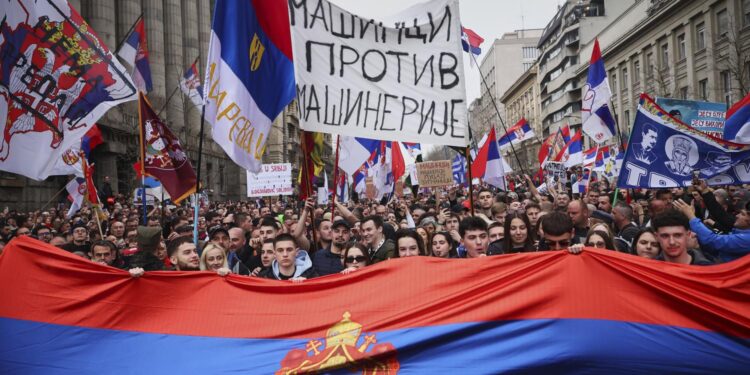Serbia is facing an intensifying domestic crisis marked by deepening political instability, social unrest, and mounting economic challenges. As tensions escalate across the country, concerns are growing both within the region and among international observers about the potential implications for Serbia’s democratic institutions and regional stability. This article, based on analysis by the German Council on Foreign Relations (DGAP), delves into the root causes of Serbia’s turmoil, explores the key players involved, and assesses the broader geopolitical risks arising from the ongoing crisis.
Serbia’s Domestic Turmoil Deepens Amid Political Deadlock
Political stagnation has gripped Serbia, with entrenched divisions between leading parties paralyzing the legislative process. Key government reforms remain stalled as coalition talks have faltered repeatedly, leaving citizens increasingly frustrated. The persistent deadlock has intensified socio-economic challenges, including rising unemployment and inflation, further eroding public trust in democratic institutions. Civil society groups have raised alarms over diminishing media freedoms and a growing perception of authoritarian tendencies within the ruling elite.
Recent protests have underscored mounting public discontent, reflecting demands for transparent governance and urgent political renewal. The complex interplay of ethnic tensions and geopolitical influences adds another layer of volatility, complicating prospects for resolution. Analysts highlight several critical issues driving the crisis:
- Fragmented political landscape impeding consensus-building efforts
- Economic instability exacerbated by external pressures
- Weakening rule of law and democratic backsliding
- Influence of regional powers shaping domestic policy directions
| Issue | Impact | Outlook |
|---|---|---|
| Political Deadlock | Governance paralysis | Continued stalemate likely |
| Economic Pressures | Rising inflation & unemployment | Potential social unrest |
| Media Freedom | Restricted journalistic independence | International criticism growing |
Economic Fallout and Social Unrest Challenge Stability
As Serbia grapples with mounting economic pressures, the ripple effects are manifesting across its social fabric, sparking widespread unrest. Inflation rates have soared, eroding purchasing power and leading to a significant rise in unemployment. The most vulnerable demographics, including youth and low-income families, are disproportionately affected, prompting frequent protests and labor strikes throughout major cities. Public dissatisfaction is further fueled by perceived governmental inertia and allegations of corruption, deepening mistrust in state institutions.
The interplay of economic hardship and social tensions presents a multidimensional challenge to national stability. Key factors contributing to the volatile environment include:
- Surging inflation: Food and energy prices have elevated household expenses by over 20% this year.
- Rising unemployment: Youth unemployment exceeds 30%, creating fertile ground for social discontent.
- Political polarization: Increasing ideological divides hamper consensus-building efforts.
- Declining foreign investment: Investor confidence is shaken amid regulatory uncertainties.
| Indicator | Current Level | Change (1 Year) |
|---|---|---|
| Inflation Rate | 21.5% | +9.3% |
| Unemployment Rate | 15.7% | +2.1% |
| GDP Growth | 0.8% | -1.5% |
| Public Protest Incidents | 145 | +55% |
Unless comprehensive reforms address these structural issues, Serbia risks prolonged instability with potential spillover effects into the broader Balkan region. Coordinated efforts involving economic revitalization, transparent governance, and community engagement are imperative to restore public trust and safeguard the country’s future.
Strategic Policy Measures Urged to Restore Democratic Governance
Amid mounting political unrest, experts emphasize the urgent need for comprehensive reforms targeting the restoration of democratic institutions in Serbia. Key recommendations include the reinforcement of judicial independence, increased transparency in governmental operations, and the establishment of robust mechanisms to ensure free and fair elections. Civic engagement must also be encouraged through improved media freedom and protection of civil society organizations, enabling them to act as watchdogs and advocates for accountability.
Strategic priorities outlined by political analysts focus on:
- Strengthening electoral laws to prevent manipulation and fraud
- Implementing anti-corruption frameworks with strict enforcement
- Enhancing international collaboration to monitor democratic practices
- Supporting media plurality to foster diverse viewpoints
| Policy Area | Proposed Measure | Expected Outcome |
|---|---|---|
| Judicial System | Independent oversight bodies | Reduced political interference |
| Electoral Integrity | Advanced voter registration databases | Transparency in election results |
| Media Freedom | Legal safeguards for journalists | Diverse and reliable information sources |
In Conclusion
As Serbia grapples with mounting political tensions and deepening social unrest, the path forward remains fraught with uncertainty. The developments outlined by the German Council on Foreign Relations underscore the complexity of the crisis, highlighting the urgent need for dialogue and reform. How Serbia navigates these challenges will not only shape its own future but also influence stability across the broader Western Balkans region. Observers and policymakers alike will be watching closely as this critical situation continues to evolve.
















